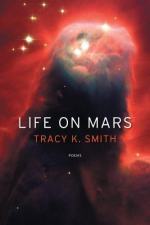|
This section contains 527 words (approx. 2 pages at 400 words per page) |

|
Life on Mars: Poems Summary & Study Guide Description
Life on Mars: Poems Summary & Study Guide includes comprehensive information and analysis to help you understand the book. This study guide contains the following sections:
This detailed literature summary also contains Quotes and a Free Quiz on Life on Mars: Poems by Tracy K. Smith.
The following version of this book was used to create this study guide: Smith, Tracy K. Life on Mars. Graywolf Press, 2011.
Life on Mars begins with a series of poems in section one that focus on visions of the future and meditations on outer space and the universe. The poem “Sci-Fi” describes the poet’s predictions for the future while “My God, It’s Full of Stars” and “The Universe is a House Party” explore the expansiveness and chaos of space and time. “The Museum of Obsolescence” and “At Some Point, They’ll Want to Know What It Was Like” focus on how people living in what used to be considered the future will look back on and attempt to understand or explain the past. “Don’t You Wonder, Sometimes?” is the second long form piece in the book, tackling issues of loss and alienation while simultaneously paying tribute to David Bowie.
Section two of the book focuses solely on the poet’s experiences following the death of her father. “The Speed of Belief,” the first and longer poem of the two poems in the section, is a seven part piece that examines the complexity and nuances of grief, from denial and depression to anger and bargaining. The following poem, “It’s Not,” sees the speaker accepting their father’s death as a transition into a deeper unknown unbound by the strictures of life.
Section three of the book takes on a more political and societal focus. The first poem, “Life on Mars,” is a collage of stories, thoughts, and conversations that all work to highlight the ways in which life on our own planet can often feel strange or alienating. “Solstice” and “No-Fly Zone” take on similar themes, addressing the issues with popular media and communication as well as modern family life. “Ransom” examines alienation by expressing the rarely heard narrative of the societal other in the form of environmentally radical pirates. The final poem of this section, “They May Love All That He Has Chosen and Hate All That He Has Rejected,” is a six part poem that centers on the root causes and impacts of hatred, first meditating on the emotion itself and later bringing to light and memorializing the stories of black victims of hate crimes.
In the fourth and final section of the book, the poems take on a more personal tone, much like in the second section, however covering a wider range of topics. “Everything That Ever Was” and “The Good Life” look at the ways in which the past and our yearning for it can influence our lives in the present, while “Aubade,” “Field Guide,” and “Eggs Norwegian” examine the way we account for ourselves as we navigate through our relationships. “Willed in Autumn” and “Song” celebrate physical and emotional intimacy, which transitions into the poems “Sacrament” and “When Your Small Form Tumbled into Me,” which describes the experiences of childbirth and conception, respectively. The final poem of the collection, “Us & Co.” is one of the shortest in the book, highlighting the brevity of human life and experience, but also the resilience of life in general.
Read more from the Study Guide
|
This section contains 527 words (approx. 2 pages at 400 words per page) |

|



